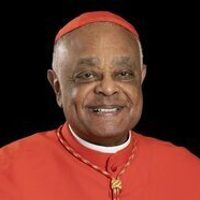I have been an enthusiastic “bird watcher” for more than 50 years. I love watching these amazing creatures go about their daily lives as up close as possible. I now have three bird feeders on the deck outside my residence and I supply as much wild bird seed as possible to my feathered friends. In each place where I have lived, I have set up feeding stations for birds so that I can observe them up close.
When I first moved to D.C., I was cautioned that the only birds that might visit my feeder stations would be pigeons. I knew, from prior episodes, that there were probably many more aviary possibilities than just our local pigeons. Each of my three bird feeders has a cage around it so that only smaller birds can take advantage of those tasty seeds.
Birds are frequently cited in scripture. Jesus himself used the splendid appearances of birds as an example of how God generously cares for all of us [Matthew 6:26 and Luke 12:24]. The Old Testament has many citations of birds from those specific creation references in the Book of Genesis to sending out doves as messengers who reported on the condition of creation after the great flood that Noah had survived in the Ark. More recently, miners have used the sensitive physical nature of birds to warn of atmospheric dangers. In scripture, there are multiple references to birds and the very Spirit of God is regularly depicted with a dove.
The father of Italian Renaissance art, Giotto, painted a charming image of Saint Francis of Assisi preaching to a flock of birds as another example of his awe for all of God’s creation. Pope Francis himself has made reverence for creation an ongoing theme of his pontificate. The Holy Father admonishes all people to care for our environment as the precious treasure that is meant to be preserved for all humanity.
There are environmentalists who would be very limiting in how we should care for the environment – some even advising against providing food for birds that might then alter their natural patterns of survival. But the Holy Father continues to admonish us to use our technology skills to preserve God’s creation for future generations.
The season of Lent offers each of us a welcome opportunity to remember God’s bountiful creation and guides us on how to use those precious gifts with respect and generosity. Laudato Si’ chides us to use the gifts of nature to provide for the needs of the human family and not simply for sordid profit. We now begin this holy season, which calls us to examine how we should charitably share from our abundance the needs of those who have so much less than do we. God’s creation is filled with many symbols of His goodness and presence – if we but find the time to look carefully about the world around us – as did Jesus when instructing His first disciples and us as well.












